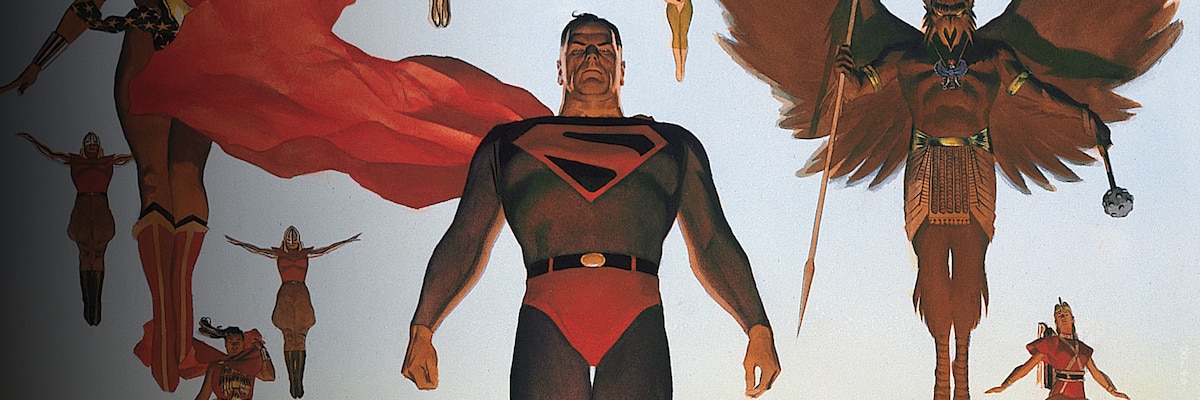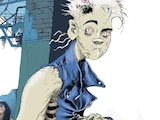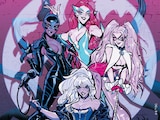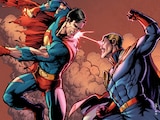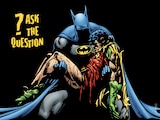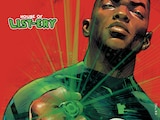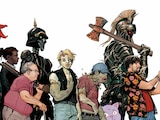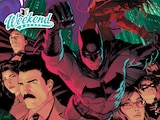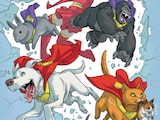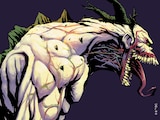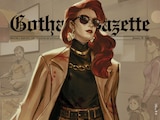Superhero stories are, at their core, power fantasies. But they often have something to say about the way power works in the real world. Its potential, its imbalances and the moral responsibility of those who wield it. Maybe that’s why Mark Waid and Alex Ross’ Kingdom Come still resonates three decades after it was first published. This 1996 four-issue Elseworlds limited series tells the tale of Earth’s heroes returning to defend humanity in the 21st century after a ten-year absence where they’d abandoned it to a new generation of amoral vigilantes. In so doing, it restores DC’s champions to their essence, examining their personalities while resisting the easy lure of deconstruction.
Kingdom Come has remained one of DC’s most enduring stories—one embraced by each new generation of fans since its publication nearly thirty years ago. This week, it receives a stunning new full-cast audio adaptation through Penguin Random House Audio, likely taking its reach even farther. For those who are new to it, or who have found themselves struggling with its unique themes and often surprising narrative, here’s what you need to know.
Sacred Origins
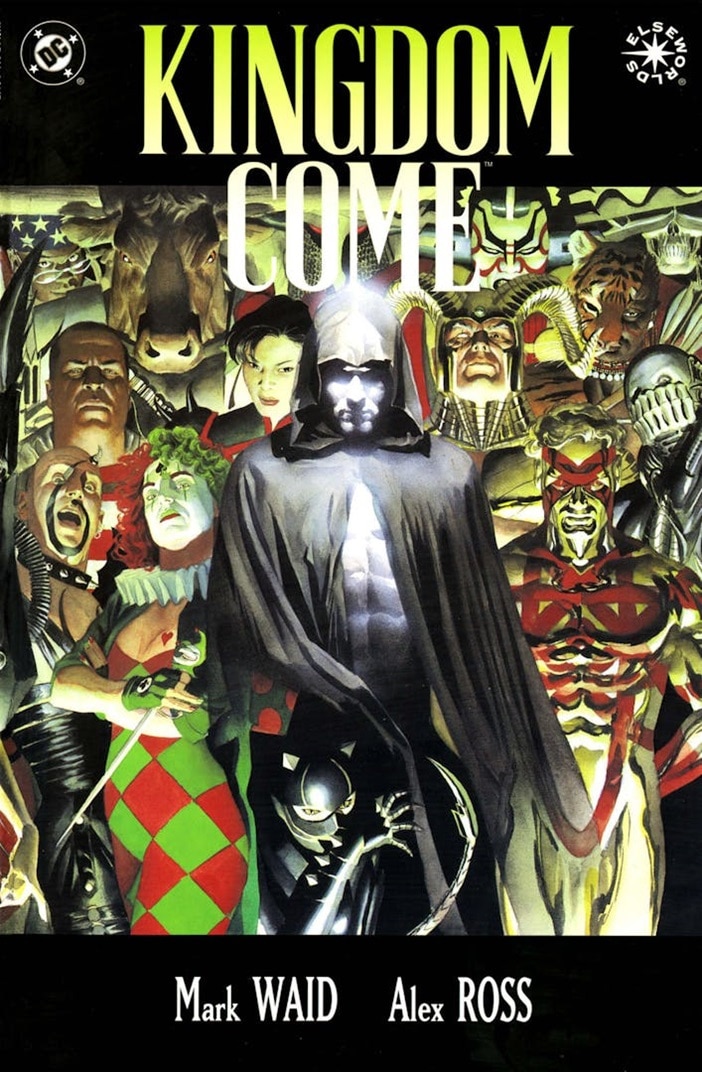
Ross first pitched the project to DC in the wake of his breakthrough success with the 1994 limited series Marvels (written by Kurt Busiek for the distinguished competition). Like Marvels, Kingdom Come would be a character-packed epic seen through the eyes of a non-powered everyman, in this case elderly Pastor Norman McCay. The son of a Protestant minister, Ross held DC’s heroes in near religious light, and his father would inspire McCay, guided on his journey by the godlike Spectre. The book’s title was taken from the Christian “Lord’s Prayer”: “Our Father, who art in heaven, hallowed by thy name. Thy kingdom come, thy will be done, on Earth as it is in heaven…”
Waid’s World
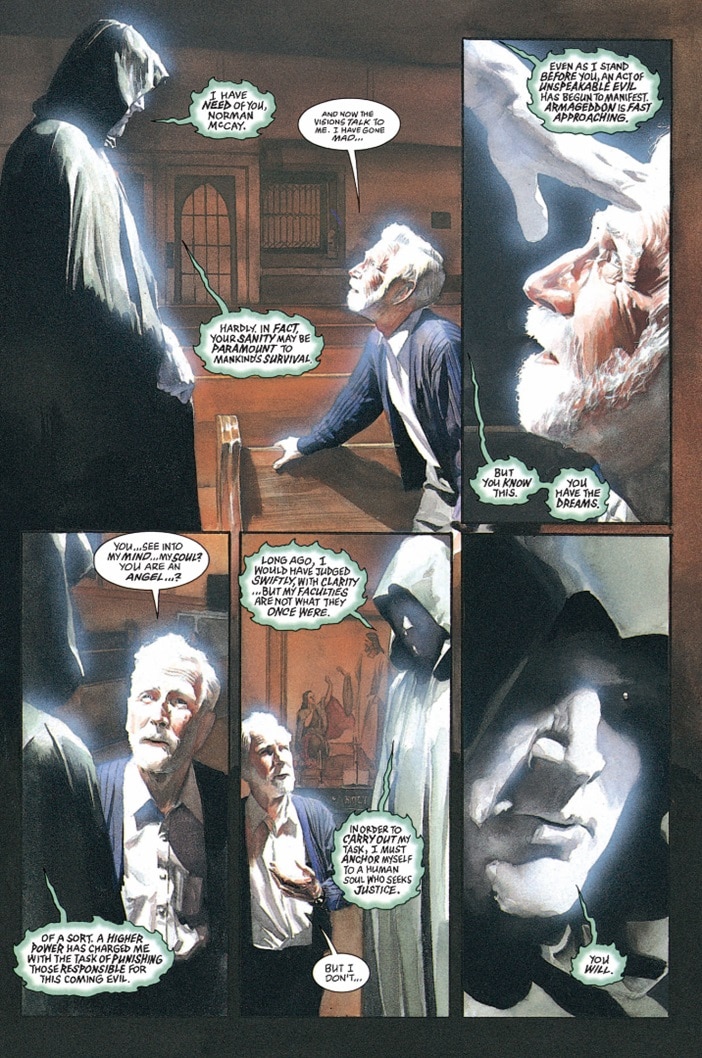
DC enlisted Mark Waid, the writer most knowledgeable about the company’s characters, to script. As Waid told me when I interviewed him in 2015, “Alex came to the table with a bunch of sketches, a rough outline of what he wanted. They were brilliant sketches. He had moments in mind. He had ideas for scenes. So he sat down with me and we started to build a plot from scratch out of his basic ideas. We worked very closely on it. I don’t think Alex gets enough credit as a co-plotter on this thing.”
A Disillusioned Superman
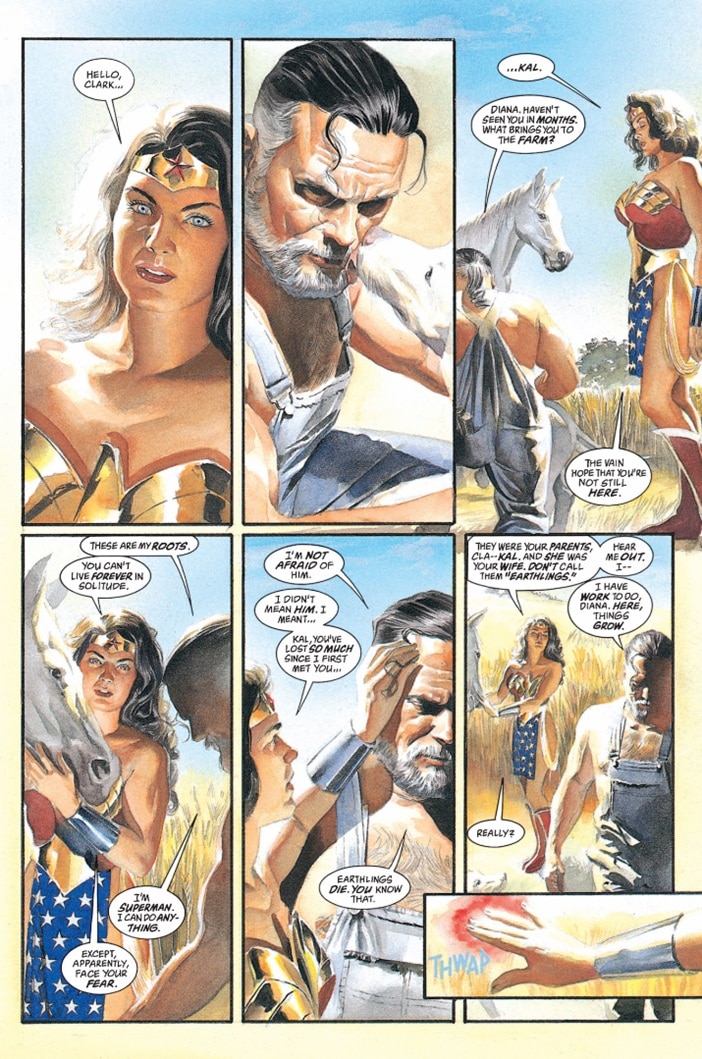
Kingdom Come’s backstory, told in flashback, reveals that the Man of Steel had lost his loved ones to the Joker. While Superman is set on bringing the maniac to justice, upstart metahuman Magog doesn’t hesitate in killing him. To Superman’s shock, Magog is acquitted of murder and the public embraces him.
“The idea that Superman,” said Waid, “had retired and gone back to create a hologram farm in the Fortress, or a fake farm, that was Alex’s [idea]. But the struggle that I had as a Superman fan was trying to come up with an answer to why he would quit. See, in my mind, Superman would never retire. It’s a never-ending battle, right? That’s the phrase. So why would he give up? The only answer I could come up with was this idea that the city of Metropolis and the world said, ‘We don’t believe in your values anymore when it comes to life and the preservation of life.’ Then Superman very much would feel like withdrawing from the world. It was the only answer I could come up with, [and] it seemed to work. But it was a very collaborative project.”
Friends or Foes?
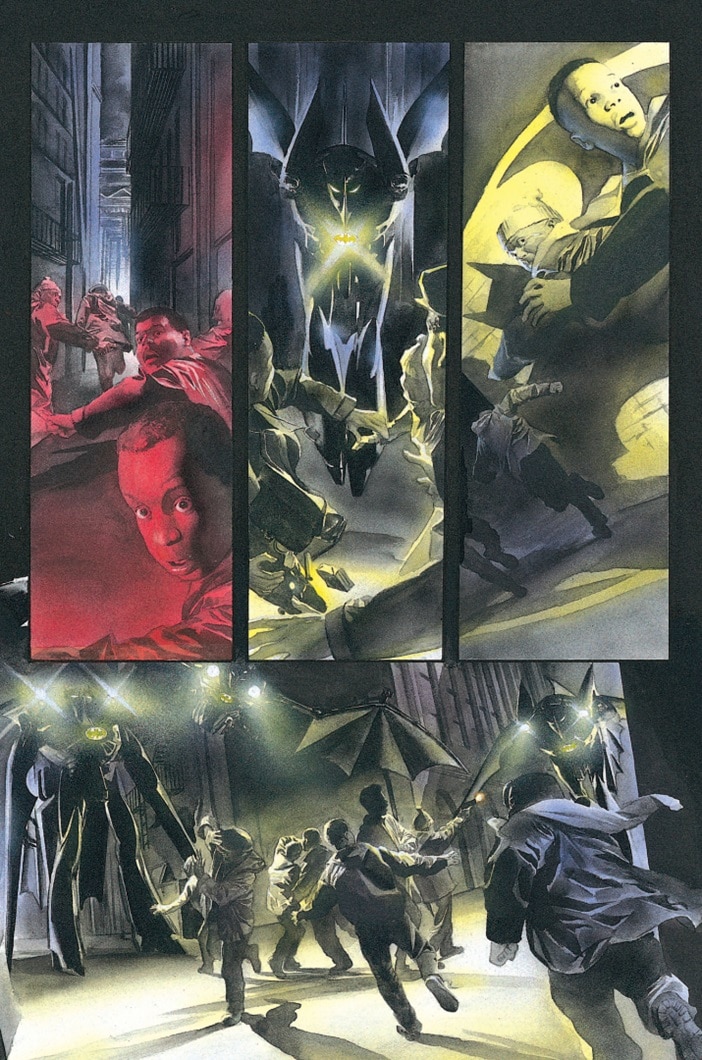
The Last Son of Krypton is brought out of retirement by Wonder Woman, who informs him Magog and his followers in their recklessness have caused an atomic explosion, killing almost a million people in Kansas and decimating the Midwest and the U.S. economy. Superman reunites the Justice League and begins drafting Magog’s followers. But the Batman and his allies Green Arrow and Black Canary disapprove of Superman’s totalitarian tactics and oppose him by forming an uneasy alliance with Lex Luthor, who’s gained complete control over Shazam. It all leads to a suitably biblical climactic battle of metahumans.
“What Mark Waid and I did with Kingdom Come,” Ross explained to me in 2016, “was to work with the common theory that [Superman and Batman] are kind of at odds, because that became popular in the last forty years—to set them up as polar opposites. So therefore, they should be somewhat ideologically contrary. To Mark’s credit, he turned a story that I had a rough idea for, that put them on opposite ends of two different armies and twisted it—where we thought things were going in one direction and they didn’t go that way at all. If anything, Batman kind of came to Superman’s rescue. I appreciate that, because as a fan, I remember they were friends for decades… The time that I put into it works within the new reality, but tries to offer up the idea that at their core, they’re both frail human beings of failings.”
Twilight of the Superheroes
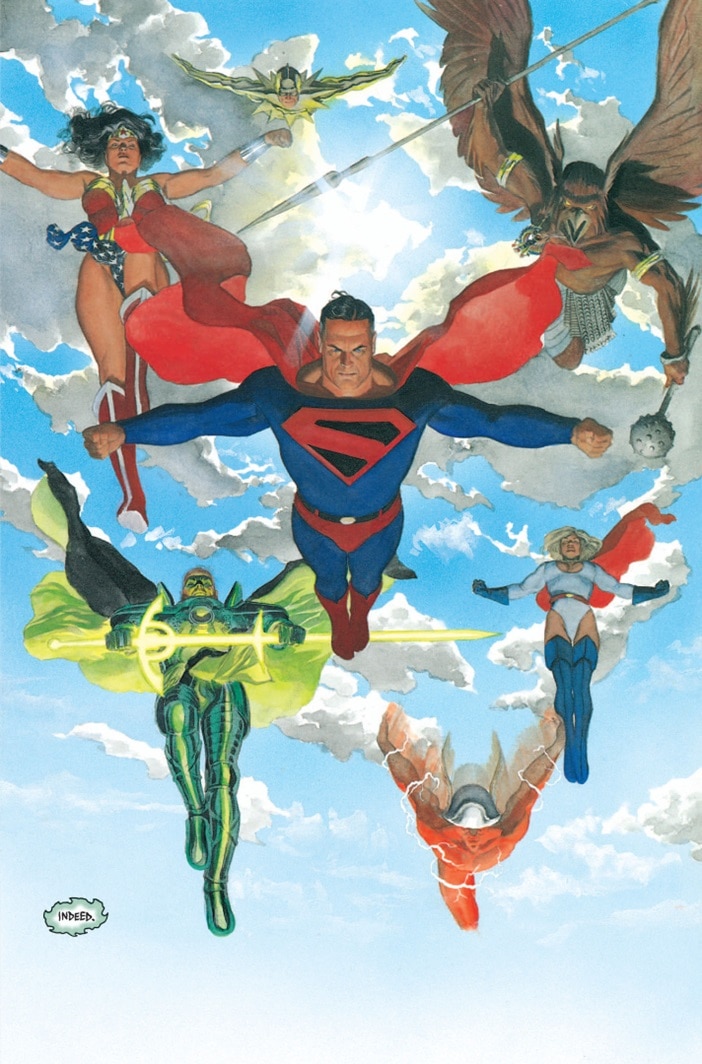
After thirty years, Kingdom Come’s impact remains palpable. Many of its concepts and designs have found their way into other iterations of DC’s characters. Superman and Batman’s costumes were brought to TV in the 2019 Arrowverse crossover event adapting Crisis on Infinite Earths, with Superman’s streamlined S-shield insignia modified for this summer’s Superman movie. Wonder Woman’s Golden Eagle Armor, worn in the book’s final battle, was featured in the 2020 Gal Gadot-starring Wonder Woman 1984. And the central premise of Superman and Batman leading opposing armies of heroes after personal tragedy causes Superman to withdraw from humanity inspired the Injustice video game franchise and comic book series.
Kingdom Come was directly adapted into a 1996 series of trading cards with new art by Ross, a 1998 novel written by former DC scribe Elliot S. Maggin, a 1999 audio dramatization and three waves of action figures from DC Direct. It also led to the 1998 sequel comic The Kingdom (written by Waid), inspired the Justice Society of America story arc “Thy Kingdom Come” and the limited series Justice League: Generation Lost, as well as the “Strange Visitor” and “Return to Kingdom Come” arcs of Waid and artist Dan Mora’s acclaimed Batman/Superman: World's Finest. The new 2025 audio adaptation, adapted by legendary audio producer Dirk Maggs and featuring a cast of over thirty actors, is the latest in this long line.
Shining a Light

Kingdom Come was released in the midst of the ultra-violent heroes craze of the ‘90s. Then and now, it serves as a wake-up call—a reminder that superheroes best function as aspirational figures and that their default setting shouldn’t be one of darkness.
“A lot of the darkness that permeates superhero comics,” said Waid, “that permeates superheroes in all media, is a fear that other people who aren’t into comics will think it’s silly and childish and so forth. But in fact, it’s the sense of wonder and amazement that is what makes superhero comics superhero comics. You need to embrace that stuff. It doesn’t mean comics need to be written for seven-year-olds. But I think that’s our job as storytellers with superheroes, because that’s what they were created to do. They were created to idolize. They were created to show a path. They were created to be moral beacons. To drag them down to our level rather than elevate ourselves to their level is a disservice.”
Kingdom Come by Mark Waid and Alex Ross is available in bookstores, comics shops, libraries and digital retailers in full-size and Compact Comics editions and can be read on DC UNIVERSE INFINITE. The new full cast audio edition, adapted by Dirk Maggs, is available this week.
Joseph McCabe writes about comics, film and superhero history for DC.com. Follow him on Instagram at @joe_mccabe_editor.
NOTE: The views and opinions expressed in this feature are solely those of Joseph McCabe and the talent interviewed and do not necessarily reflect those of DC or Warner Bros. Discovery, nor should they be read as confirmation or denial of future DC plans.
